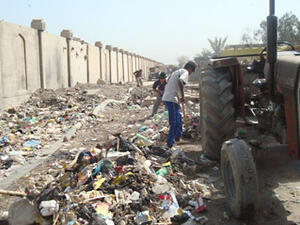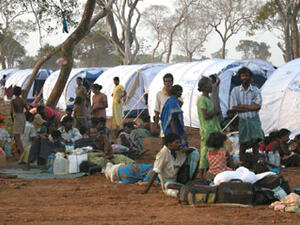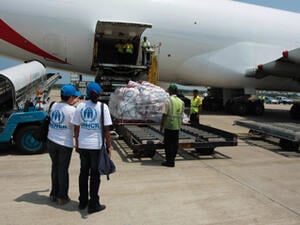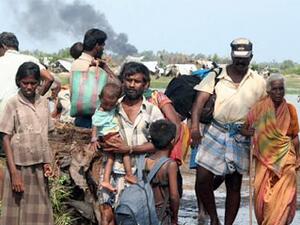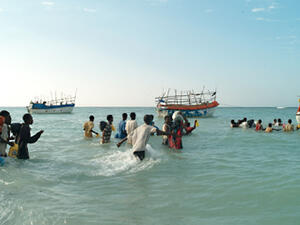Iraqi refugees in Pakistan, histories as complex as Iraq
Iraqi refugees in Pakistan, histories as complex as Iraq
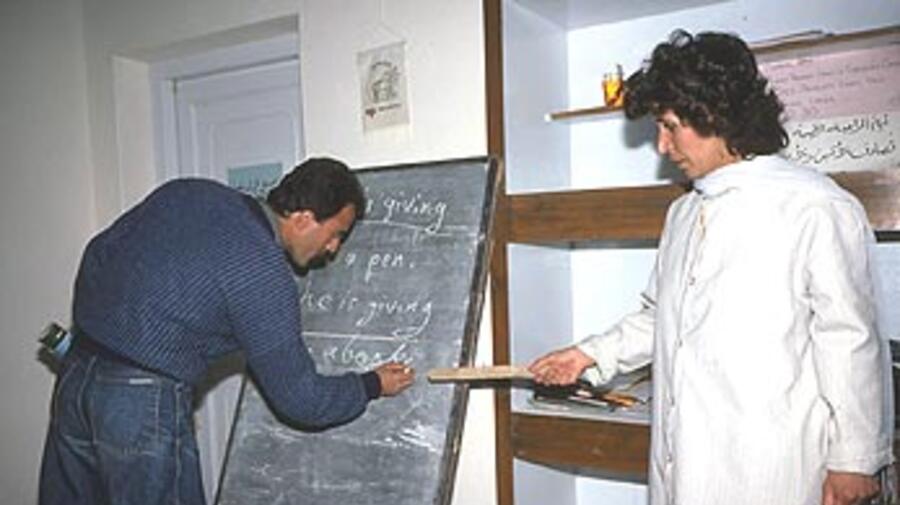
An Iraqi refugee learning English in Quetta, Pakistan.
ISLAMABAD, Pakistan, March 17 (UNHCR) - Iraqi refugees arrive in Pakistan with complex tales of jails, torture and dangerous escapes - the 170 Iraqi refugees currently recognised by the UN High Commissioner for Refugees have histories that are as diverse as the political and ethnic makeup of their country.
In a room at the Islamabad centre where UNHCR provides support for those in greatest need, about a dozen of them assembled to tell their stories. One was a former brigadier in the armed forces, another was a man with part of his ear chopped off for deserting from the army, yet another a former activist in an Islamic party that was agitating against Iraqi President Saddam Hussein.
One man was from the north of Iraq, dressed in ragged clothes and limping on a foot wounded long ago in the conflicts that have battered Iraqis for more than two decades. Across from him sat a man dressed neatly in suit and tie.
All declined to release their names, wary of creating problems for relatives.
"I had had two heart attacks and the doctors told me I needed a bypass operation or I would die," said a man in his 50s who had left his home city of Karbala five years ago - not originally because of politics, but because of a lack of medical care.
"I couldn't get the operation done in Baghdad because of the embargo," he said, referring to the economic sanctions that have severely limited imports into Iraq since its 1990 invasion of Kuwait. But the Iraqi government wants to hold on to people with his skills - a senior engineer and air-conditioning specialist.
"Every ministry is the same, they don't allow people of my rank to travel," said the man, who had been a general manager in his enterprise. "I didn't want to die. I left through the Kurdish north with illegal documents."
He had his operation in Karachi, Pakistan, in 1999, and cannot return to Iraq, where he would face persecution because of his illegal departure. While he is worried about his wife and children - especially two who remain unmarried at home - the engineer is awaiting either a political change inside Iraq or resettlement in a third country.
The rest of the 170 Iraqi refugees in Pakistan are in a similar situation. Some had trouble with Saddam's government, some with Kurdish authorities in the autonomous north who defy him. They do not feel able to return to Iraq at present, and many hope for resettlement in a third country. In addition, UNHCR is examining requests by a further 216 Iraqis for asylum.
In the current uncertainty over Iraq, there is no expectation that any decisions on resettling Iraqis will be made in the near future. But UNHCR has also appealed for governments not to force any rejected Iraqi asylum seeker to return now to a country that could soon be enveloped in war.
The Iraqi refugees are a major part of the 845 non-Afghan refugees presently being handled by UNHCR in Pakistan. Understandably, this protection work of the agency has been overshadowed by the publicity surrounding its efforts to help millions of Afghan refugees to return home.
On the day the Iraqi refugees were meeting in Islamabad, about 300 Afghans climbed aboard trucks and went home with UNHCR assistance to Afghanistan - the first of hundreds of thousands of Afghans who are expected to return voluntarily this year. In 2002, following the hopes raised by the installation of a new government in Kabul, UNHCR assisted nearly 1.6 million refugees back to Afghanistan from Pakistan.
In comparison, assisting the Iraqis, the 387 Somalis, the 145 Iranians and the 143 refugees from other countries looks like a small task. But, unlike most of the Afghans who entered Pakistan before 1997 and were given refugee treatment as a group, all asylum seekers from other countries have to go through an individual status determination. Pakistan does not allow refugees to work, so UNHCR has been assisting the most vulnerable with small monthly support payments.
Contact with relatives left behind is limited or non-existent, a cause for increasing worry as a US-led invasion of Iraq appears imminent. A 47-year-old Shiite who fled from the south of Iraq in 1988 and arrived in Pakistan in 1999 after a decade in Iran, said he had called his brother in Iraq last month - his second phone call home since leaving his homeland 15 years ago.
While some talk of a possible return to Iraq if conditions improve, others have made a complete mental break. Their experiences were too traumatic to contemplate a return.
One 28-year-old from the southern Iraqi city of Najaf twisted his head to show why he was a refugee. His ear was mutilated.
He had been conscripted into the Iraqi army when he turned 18, but ran away after two months. During his two-and-a-half year sentence, he was brought before a military judge who ordered him taken to a hospital, where a chunk of his ear was sliced off as a permanent reminder to everyone that he had been a deserter.
"Afterwards I could not work because everyone needs clearance from the military," he said. "I couldn't open my own shop because the Chamber of Commerce requires a certificate from the military."
The young man said he still has limited contact with the rest of his family back in Iraq through letters, but after his bad experience he has no desire to ever return: "I would find the same trouble because Iraq is not going to be good for decades."



